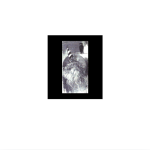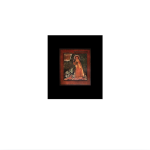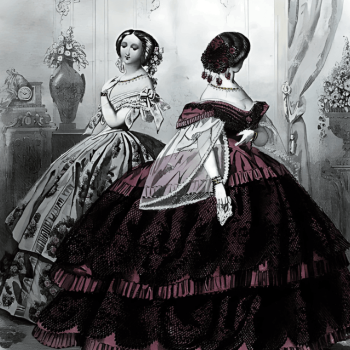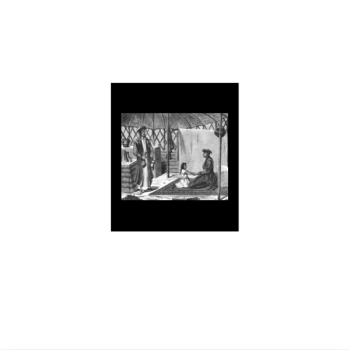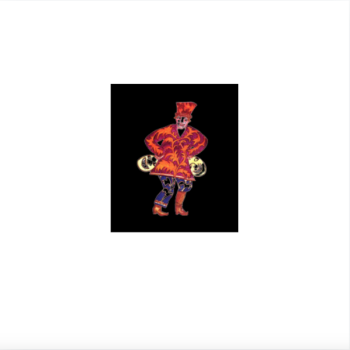CONFESSION
April 16, 1840.
Vera sat on the window and watched, mesmerized, as the hard white snow fell silently to the ground. She found it interesting when it fell under the wheels of their wagon and turned into mud, or “coffee jelly” as Vera would say. But Winter passed quickly. But soon the frosty creaking and squealing had ceased. The icicles, like translucent glass rods, were no longer in sight! Everything loosened, and melted, and water flowed through the streets. The Volga looked black, streaked, and agitated, as if someone had deliberately dug it all up only to dirty it.
Strastnaya Sedmitsa (Passion Week) had arrived, which Vera only noticed because she and Dede Andrushka were served an ordinary lunch, while everyone else was served light, meatless dishes of fasting. From what Vera understood, Baba Lena and her aunts ate such food and went to the church often, because Lent was the time in which evil people who did not believe that Jesus Christ was their God, “took Him, tortured Him, and killed Him.” Vera wanted to fast, too, but the grownup would not let her. It was on the advice of their doctor, who forbade giving her meatless foods. This German doctor (or maybe he was French,) was a very tall man, with a “duck nose,” whom Nanny Nastya despised. “He has sideburns like a dog!” she would say. (Everyone agreed.)
The whole Easter Week was regarded by the church as one great festival, in fact, the greatest and most important festival of the year. During this period every church door remained open, as well as the imperial doors of the Iconostasis, the golden doors of the holiest of holies which were otherwise kept shut the rest of the year. The devout, therefore, went to the churches the whole week, generally attending a long mass in the morning and evening. This, along with the fasting, was preparatory for the sacrament of Confession, which, in the Russian Church, had a much more general sense. It was ordinarily made only once a year, during the first or last week of Lent. It was not necessary to name any particular sin, but that in acknowledging themselves guilty of having broken the commandments, they were exhorted by the priest, and advised to repent. The rite was generally performed at home, not in the church. The smallest of children were expected to confess (but they were not required to fast.)[1]
Baba Lena and Helena Andreevna complained that there was no way of getting around. (Riding on runners was difficult enough for horses, but in wheeled carriages, it was positively terrifying.) There was a bustle in the whole house. Everyone was washing, cleaning, tidying up. Baba Lena kept their head cook, Maxim, longer in the evening when he came to the order. She also consulted, more often than usual, with Baba Kapka, who rattled her bunches of keys more anxiously, and grumbled louder (and more often) when quarreling with the butler and the maids. Nanny Nastya became quieter and took less and less part in the trouble of household chores. In general, during the entirety of Lent, all Nanny Nastya did was clean the vestments on the images, polish the icon cases, and light the candles and lamps inside of them. She fasted the first week and the second time during Holy Week. In the evenings they knew when Nanny Nastya was at church, but in the mornings, no one noticed her absence, because she went to matins and early mass. In fact, Nanny Nastya became so quiet by the end of Lent, that her voice was scarcely heard. During the entire Holy Week, she only ate one piece of bread per day; and on Friday and Saturday, she didn’t consume anything at all.
On Wednesday evening a priest and a sexton came and served an all-night vigil in their hall. The whole house, all the people, even the cooks and coachmen, convened together in the hall, or to the doors that were open into the hallway and corridor. Vera crossed herself very diligently, and knelt, trying to imitate the grownups in everything. She did not know how to pray, however, and the most varied thoughts occupied her mind. She looked around in surprise and, per usual, formulated hundreds of questions that she would ask Baba Lena and Antonia the following day. After the all-night vigil, everyone quietly dispersed, almost all the candles in the hall were extinguished, but the priest remained at the lectern in the corner, under the brightly consecrated image of the Savior.
“What is happening?” Vera whispered, tightly squeezing Helena Andreevna’s hand.
Helena Andreevna took her into the adjacent living room. “We will confess,” she explained. “We will tell our sins to the priest.”
Vera wanted to question her more clearly, having understood very little from her answer; but something in her mother’s face made her fall silent and just look at everything more carefully, and postpone her questions for another time. Everyone went out into the living room and locked the doors tightly. Vera looked anxiously at the door. It was opened slightly, and she could still see Dede Andrushka, the only one left in the hall. “Go, chère amie,” he told Baba Lena. “I’ll go downstairs now.”
Vera just stared at the open door of the hall. She could see the dark figure of the priest with his back to them, against the light background of the illuminated corner in front of the lectern. The doors closed again. Baba Lena, crossing herself, entered the hall.
“And I will confess too, but you won’t!” Lelya whispered. “I am big, and you’re still a stupid, little, baby!”
“Aren’t you scared?” Vera asked in horror.
“How is this scary! Here’s more nonsense! What is there to be afraid of? Honestly! No! I am not afraid to go there.”
Vera continued to look at the heavy door, behind which something unknown to her, but very important, was happening. It seemed to her, not entirely safe, and she was glad that she did not need to go enter. She did not understand at all what it meant to confess, and she was afraid for everyone going into the dark hall. She sighed freely when everyone, one by one, came back safe. When Lelya’s turn came to go, she noticed that, despite all her boasting, she was very pale. Vera felt so sorry for her, and so scared for her, that she involuntarily fell to the crack of the door.
“Verochka! Move away,” said Aunt Katya. “How can you watch?”
Owing to her peculiar psychic temperament, some grownups were unconvinced that Lelya was not, in fact, in “possession by the devil” and tried to drench her “in enough holy water to have floated a ship” and exorcised by priests “who might as well have been talking to the wind for all the effect they produced on her.”[2]
Vera walked away but was very happy when Lelya returned to them. She looked at her sister now with special respect and some kind of expectation that Lelya should completely change. She very soon realized that Lelya was exactly the same as she had always been. After confession, they sat down to peel raisins and almonds for babkas and mazurkas. Several times Lelya began to play pranks and laugh, which amazed Vera (very unpleasantly.)
“Hush, children,” said Helena Andreevna. “How is it possible to laugh like that on the eve of communion?” She gave Lelya a disapproving look. “And you, Lelya, have you no shame? You are a big girl, now. You have just come from confession and are laughing loudest of all!”
Baba Lena did not say anything, she simply looked at the children affectionately, and although she did not laugh, her kind dark eyes, and her whole sweet, friendly, face smiled at them against her will.[3]
-
- MOTHERS & DAUGHTERS
- A LANTERN
- CHRISTENING OF THE DOLL
- DASHA & DUNYA
- GRUNYA
- NANNY NASTYA
- NANNY’S FAIRYTALE
- CONFESSION
- IN THE MONASTERY
- PREPARATIONS FOR THE HOLIDAY
- EASTER
- THE DACHA
- THE MELON POND
- MIKHAIL IVANOVICH
- THE WARLIKE PARTRIDGE
- LEONID
- NEW WINTER
- HISTORY OF BELYANKA
- THEATRES AND BALLS
- YOLKA
- REASONING
- ROAD
- CAMP
- IN NEW PLACES
- THE GRAY MONK
- VARENIKI
- THE TRIP TO DIKANKA
- WHAT HAPPENED IN THE DOLL HOUSE
- ANTONIA’S STORY
- “A WINTER EVENING”
- THE BLACK SEA
- CRIME AND PUNISHMENT
- PANIKHIDA
- PRINCE TYUMEN
SOURCES:
[1] Kohl, J. G. Russia And The Russians In 1842. Carey And Hart. Philadelphia, Pennsylvania. (1843):167; Montefiore, Judith Cohen. The Englishwoman In Russia. John Murray. London, England. (1855): 211.
[2] Sinnett, Alfred Percy. The Letters Of H. P. Blavatsky To A. P. Sinnett And Other Miscellaneous Letters. T. Fisher Unwin Ltd. London, England. (1925): 25.
[3] Zhelihovskaya, Vera Petrovna. How I Was Little. A. F. Devrien. St. Petersburg, Russia. (1898): 65-70.


